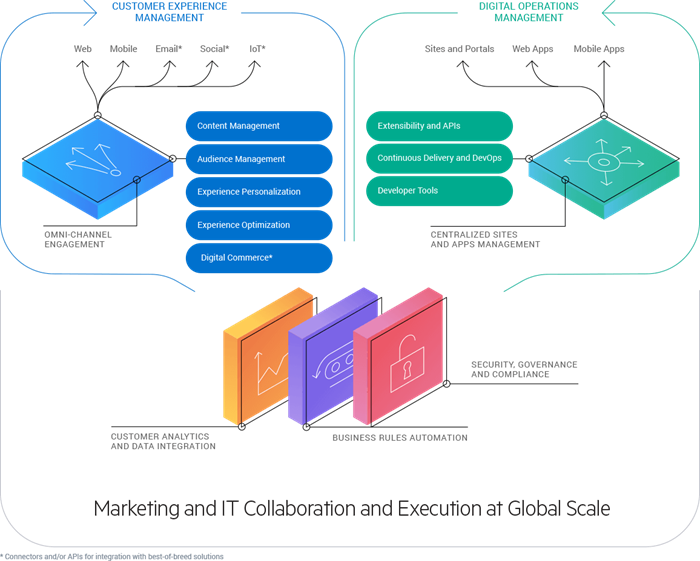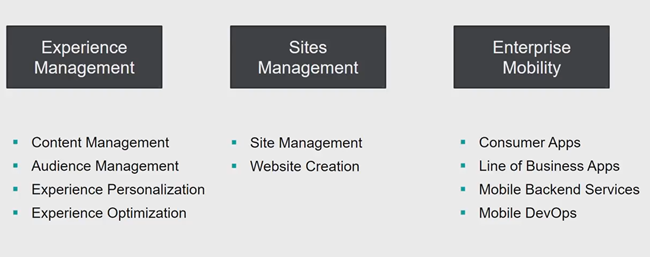Digital Transformation Solution DigitalFactory by Progress
Progress announced the availability of Progress DigitalFactory, the personalized digital transformation solution that allows developers, IT administrators and marketing teams to quickly and efficiently drive compelling, consistent and personalized customer experiences.
 "We spent the last year laying the foundation for Progress DigitalFactory, leveraging our skills and proven web content, mobility, and data assets. We made an investment in the future of our customers, to better enable them to rapidly innovate by providing more advanced capabilities that drive business agility and governance," said Michael Benedict, Chief Product Officer, Progress. "Progress DigitalFactory brings a cloud-based solution to market so technology and marketing teams can align, build and optimize customer experiences in a way traditional CMS and first-generation experience platforms simply can't provide."
"We spent the last year laying the foundation for Progress DigitalFactory, leveraging our skills and proven web content, mobility, and data assets. We made an investment in the future of our customers, to better enable them to rapidly innovate by providing more advanced capabilities that drive business agility and governance," said Michael Benedict, Chief Product Officer, Progress. "Progress DigitalFactory brings a cloud-based solution to market so technology and marketing teams can align, build and optimize customer experiences in a way traditional CMS and first-generation experience platforms simply can't provide."
The DigitalFactory system is based on technology Progress acquired in December 2014 when it bought Telerik AD and its development tools for building cloud, Web, mobile and desktop applications, for $262.5 million. The Progress SiteFinity Digital Experience Cloud content management system also plugs into the DigitalFactory platform.
DigitalFactory is designed to address the challenge of creating and managing a few websites and mobile apps at scale with the same efficiency, speed, governance and security without neglecting a consistent and personalized customer experience. The motivation behind developing this digital transformation solution was the need for a platform comprised of multiple products that all fundamentally share the same common objective of building and delivering engaging customer experiences, instead of just combining complementary technologies into a single platform. Because, the company believes when businesses are evaluating digital transformation solutions, they shouldn’t only focus on checking off functionality boxes as it’s more about understanding if the benefits of the combined products in a single platform are strengthened or compromised.
The product line includes DigitalFactory for Sites, for managing and scaling websites and digital assets through content creation, management, and reuse while maintaining security and governance requirements; DigitalFactory for Engagement, which tracks, personalizes and improves customer engagement across multiple channels and across business lines, assets and properties; and DigitalFactory for Mobile, which developers use to build mobile applications for iOS, Android, and Windows devices.

Key Benefits
-
Allows for content creators to focus solely on creating and maintaining compelling, differentiated content without worrying about the constraints of multiple delivery channels.
-
Makes sure some important components of content such as critical positioning and branding elements are utilized consistently across business lines and distributed web and mobile assets.
-
Increases conversion rates and additional revenue opportunities by providing a consumer-tailored omnichannel experience.
-
Reuses existing marketing and web developer resources to create new websites and mobile applications.
-
Tracks and analyzes the customer’s cross-channel journey with a single view of all activity across all major marketing and sales systems.
-
Due to advanced customer analytics it enables users to take action based on recommendations to drive an optimized customer experience.
-
Allows for the management of content consistently across a global web infrastructure supporting a sheer volume of internal and external web sites without depending on IT or sacrificing quality.
-
Makes collaboration between the business and development teams easier and faster.
-
Provides faster time to market with an integrated cloud-based platform.
-
Delivers truly native mobile experiences and a line of business apps for iOS and Android, built with what technology developers already know—JavaScript.
-
Solves the scalability challenge as the platform supports decentralized execution with centralized governance.
DigitalFactory Use Cases

From an experience management perspective; the challenge is creating highly personalized content with a consistent style for multiple buyer personas and customer journey stages and then publishing across various channels and devices without prolonging the time to market. However, the loop doesn’t close there as brands should keep updating their content strategies based on a real understanding of the activities with the highest impact on revenue.
The DigitalFactory platform enables users to streamline the process of creating, editing, translating, and publishing. Content creators are empowered to build and manage landing pages, mobile apps, and lead capture forms without IT resources. Finally, the resulting asset can be easily published across brands, geographies, devices, and languages from a central integrated system to eliminate duplicate work.
From a sites management perspective; the challenge is delivering digital experiences to market faster, within budget and at scale through consistent, effective, and highly personalized consumer interactions.
What the DigitalFactory offers is an integrated cloud-based platform that facilitates rapid collaboration between Marketing and IT, easy data integration and extensibility and provides easy reuse of content, code, components and skillsets. On top of those, the platform offers a centralized governance framework that also gives departments, local markets, and digital agencies the freedom to innovate within the framework.
From an enterprise mobility perspective; the challenge is delivering secure, engaging mobile apps that fully exploit the enterprise data sources, offer scalability and security, and improve business processes through intelligent workflow automation to boost operational efficiency across key departments like Sales, Customer Service, Finance, HR, and Field Operations.
What the DigitalFactory offers is an open architecture and the ability to connect all enterprise data silos, alongside enterprise-grade security. Another capability of the platform is not only extending existing iOS/Android apps but also targeting multiple mobile platforms with a single codebase while delivering a native experience.
From a usage perspective; Kevin Hourigan, President of Bayshore Solutions said: "Some of the most well-known brands in the world are often part of a larger, highly complex ecosystem of business units, with hundreds of sub-brands and thousands of digital properties, each requiring real-time, dynamic content and a customizable, personalized end-user experience," said Hourigan. "Customers expect a seamless experience—they don't care how hard it is for you to create it. Built upon trusted, proven Progress technology, the Progress DigitalFactory solution solves this scalability challenge with support for decentralized execution with centralized governance.”
In addition, Des Plaines, IL- based digital agency partner and website developer, AmericanEagle.com has been working with the SiteFinity system as well as some of the Telerik software. Therefore, its President Michael Svanascini got to use the demo of the Progress DigitalFactory solution in May and here’s what he had to say about the product:
"What I saw is that everything is very well integrated together," Svanascini said in an interview. A company can build a website, then easily bring in the marketing engagement and mobile capabilities without a lot of additional development," he said. "It's a huge time saver. That, in turn, makes it easier for AmericanEagle.com to help its customers react quickly to changing market conditions.”
Here’s the well-explained video of the demo presented by Anton Hristov, Director, DigitalFactory Product Marketing, Progress:
Are We Living in Digital Denial?
Last May, Progress announced the results of its recent global survey, “Are Businesses Really Digitally Transforming or Living in Digital Denial?” The purpose of the survey was to analyze business leaders’ perspectives on digital transformation. Survey respondents included a mix of more than 700 global C-Level/VP decision makers.
Here are the key findings from the survey:
-
96% of organizations consider digital transformation critical or extremely important while 62% claim their business is in denial over the need of digital transformation.
-
86% say they have two years to make inroads before feeling the consequences, both in financial and competitive terms, while 55% say a year or less, and 59% are worried they may already be too late.
-
99% agree the main driver for digital transformation is optimizing customer experiences and engagement; 61% say customer engagement is the first priority for the next 12 months, and 50% plan to invest in building applications in the next year.
-
72% feel IT is more likely to be the final decision maker/budget holder for digital initiatives; 78% say better alignment of IT and marketing is needed to deliver on digital transformation efforts.
-
58% say a high reliance on IT to deliver strategy is a barrier to providing improved customer experience through digital transformation; more than half cite lack of skills and leadership as key barriers.
On the heels of the announcement of this survey, our industry expert Scott Liewehr discussed with the seasoned Digital Marketer and one of the CMS-Connected contributors Leah Kinthaert on digital transformation. I would highly recommend watching this 18-minute segment below as she gives her contemporary ideas from a marketing perspective on the topic. Or you read the recap article here.


Venus Tamturk
Venus is the Media Reporter for CMS-Connected, with one of her tasks to write thorough articles by creating the most up-to-date and engaging content using B2B digital marketing. She enjoys increasing brand equity and conversion through the strategic use of social media channels and integrated media marketing plans.